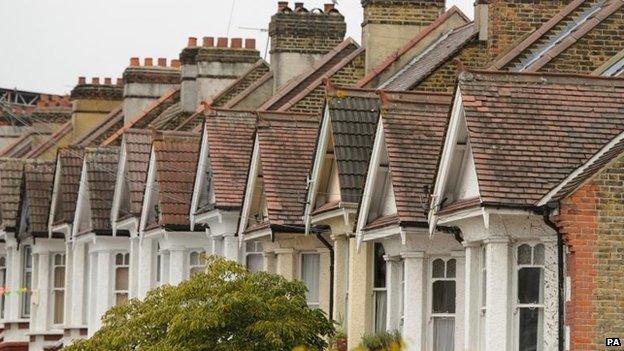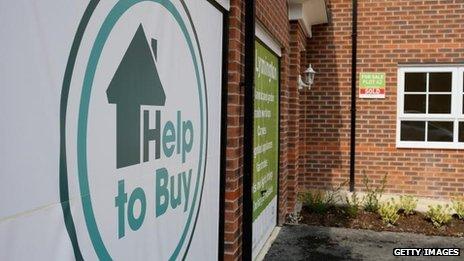Help to Buy irrelevant to London bubble
- Published
- comments

So in case anyone thinks that the bubble in the London housing market has been caused by the government's second Help to Buy scheme, today's stats show that is an absurd notion.
The important questions about Help to Buy are different ones:
has it been helpful in providing affordable mortgages to first-time buyers?
has it been useful in reviving the housing market outside London?
is it in fact a waste of effort and money, because the housing market was in the process of rebounding anyway?
is it appropriate for the taxpayer to subsidise mortgages?
The killer stat, when it comes to London, is that just 0.6% of all housing transactions funded by mortgages involved a Help to Buy government guarantee. The proportion would be even lower, if the large number of cash purchases in London were included.
And in the most red-hot part of London's housing market, Brent - where prices have been rising at annual rate of about a third - there has been just one Help to Buy mortgage.
In the land of the super-rich, Kensington and Chelsea, there have been two Help to Buy mortgages.
London prices, rising at an annual rate of 17%, are being driven by cash purchases being made by foreign investors, by a local economy that is reviving much faster than anywhere else in the UK, by buy-to-let purchases and by old-fashioned speculative fever and fervour.
Huw van Steenis of Morgan Stanley estimates that buy-to-let mortgages in London had more than 10 times the impact of Help to Buy in the first three months of the year.
In London, Help to Buy is a near irrelevance.

So if the London bubble poses the greatest current threat to financial and economic stability, as the governor of the Bank of England recently opined, abolishing it or modifying it would make damn all difference.
Which poses something of a problem for the Bank's Financial Policy Committee (FPC), since at the top of its agenda for next month's meeting is what to do about that localised overheating.
It would be slightly odd, given the data, if the FPC put pressure on the government to scale back or abolish Help to Buy.
Apart from anything else, Help to Buy is being used at the bottom end of the market, not the frothier top end: at the end of March the price of houses bought or remortgaged through the scheme was just 60% of the average UK house price.
Or to put it another way, Help to Buy appears to be helping first-time buyers - who represent 80% of all Help to Buy deals - and those on lower incomes.
More interesting is not whether Help to Buy is some lethal danger to the sustainable revival of the UK economy - it is whether there was any need for it.
There the answer is nuanced.
Some 95% of housing completions funded by Help to Buy were outside London, including 14% in the South East, 14% in the North West and 9% in Yorkshire and Humber.
What is striking is that in the more depressed regions of the North East, Northern Ireland and and Wales there were relatively few Help to Buy mortgages deals: collectively those areas represent just 10% of all such subsidised transactions.
So here is one important uncertainty: is Help to Buy stimulating demand or responding to demand?
If you look at the regional pattern of take-up, Help to Buy seems to be used after local people start to feel more confident, rather than causing them to feel more confident.
And, for the avoidance of doubt, the revival in the UK housing market was under way for the best part of a year before Help to Buy was launched.
All of which broadly means that Help to Buy should probably not be seen through the prism of financial stability or economic policy, but as social policy.
What matters about Help to Buy is whether, in a UK suffering from a chronic shortage of residential accommodation that causes housing to be pricey, it is appropriate for the government to provide subsidised mortgages to those on lower incomes.
Which is more about politics than economics, about whether that's the best and fairest use of public money.